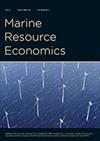Improving Fisheries Management in Developing Countries
IF 1.7
3区 经济学
Q2 ECONOMICS
引用次数: 1
Abstract
The adoption of individual harvesting rights, such as IQs, has substantially improved the economics of numerous fisheries around the world. Unfortunately, many developing nations cannot employ these management systems because they lack the ability to enforce them. This paper argues that in many of these fisheries, properly designed community rights-based management regimes (CFMRs) will both greatly simplify the enforcement problem and create conditions conducive to economically efficient fisheries. The key features of such a CFMR for Lake Victoria fisheries are outlined and its workings explained. The essence of the system is the allocation of strong harvesting rights, similar to IQs, to the lake’s fishing communities combined with total allowable catch (TAC) limits for the entire lake. The net economic benefits of a project to design, install, and operate this CFMR are estimated. While the estimated net benefits are highly positive, they are much smaller than the attainable net economic surplus obtainable from the fishing activity only.改善发展中国家的渔业管理
采用个人采伐权,例如iq,大大改善了世界各地许多渔业的经济状况。不幸的是,许多发展中国家无法采用这些管理制度,因为它们缺乏执行这些制度的能力。本文认为,在许多这样的渔业中,适当设计的基于社区权利的管理制度(CFMRs)将大大简化执法问题,并创造有利于经济高效渔业的条件。概述了维多利亚湖渔业CFMR的主要特点,并解释了其工作原理。该制度的本质是将强大的采集权(类似于智商)分配给湖泊的渔业社区,并结合整个湖泊的总允许捕获量(TAC)限制。对设计、安装和运行CFMR项目的净经济效益进行了估算。虽然估计的净收益是高度正的,但它们远小于仅从捕鱼活动可获得的净经济盈余。
本文章由计算机程序翻译,如有差异,请以英文原文为准。
求助全文
约1分钟内获得全文
求助全文
来源期刊

Marine Resource Economics
农林科学-渔业
CiteScore
4.30
自引率
10.30%
发文量
25
审稿时长
>12 weeks
期刊介绍:
Marine Resource Economics (MRE) publishes creative and scholarly economic analyses of a range of issues related to natural resource use in the global marine environment. The scope of the journal includes conceptual and empirical investigations aimed at addressing real-world oceans and coastal policy problems. Examples include studies of fisheries, aquaculture, seafood marketing and trade, marine biodiversity, marine and coastal recreation, marine pollution, offshore oil and gas, seabed mining, renewable ocean energy sources, marine transportation, coastal land use and climate adaptation, and management of estuaries and watersheds.
 求助内容:
求助内容: 应助结果提醒方式:
应助结果提醒方式:


